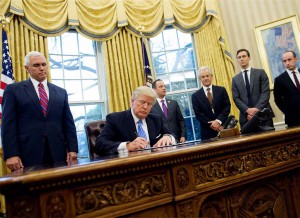
President Donald Trump threatened to place a 25% tariff on European-made vehicles coming into the U.S. last weekend.
President Donald Trump dusted off a threat from early in his administration over the weekend by tweeting he would impose a 25% tax or tariff on new vehicles imported into the United States.
The tweet about taxing European cars was apparently in response to remarks from a European Union policy maker, suggesting that if the Trump administration imposes tariffs on steel and aluminum imports the EU could slap tariffs on iconic American products such Harley Davidson motorcycles, bourbon and blue jeans.
Trump raised the possibility of slapping a tax on European cars during one of the early skirmishes around trade rules soon after moving into the White House in January 2017. One of his earliest proposals, a so-called “border adjustment tax” was buried after heavy lobbying by members of Congress, automakers and car dealers.
Car dealers are also vowing to fight Trump’s call for a tariff on imported steel and aluminum. Critics contend that the last time the U.S. imposed tariff on steel during the Bush administration, it wound up costing the U.S. more 200,000 jobs as appliance makers and other key users of steel shifted production abroad.

The G-Wagen will not be coming to the U.S. without a 25% tariff, if the EU makes good on a threat to tax steel and aluminum.
Nevertheless, Trump made the promise to return manufacturing jobs to the U.S. a centerpoint of his successful 2016 campaign for President and identified Mexico as one nation that has benefited from jobs transferred from the United States.
(Trump tariff plan ripped by auto dealers, key Republicans. Click Here for the story.)
As President has continued to hammer away on trade-related issues and the latest attack on trade comes just as the Republicans are trying to defend an open Congressional seat in southwestern Pennsylvania.
While academic trade experts continue to warn that a trade war could ultimately hurt the U.S. and global economy, so far, the Trump administration hasn’t paid much of a political price for its protectionist rhetoric. The business community still largely believes it can prevail on Congress to blunt the administration’s excesses.
All of the major European carmakers, Daimler AG, BMW, Volkswagen, Fiat Chrysler Automobiles N.V. and Volvo all have employees spread across the U.S. and have major factories or offices in several key states from Michigan to Georgia.
(Click Here to see more about the halted NAFTA talks and Trump’s proposed tariffs on steel, aluminum.)
Volvo is building a new plant in South Carolina and Mercedes-Benz announced a $1 billion expansion of its plant in Alabama and both Porsche and Mercedes-Benz have or will have lavish new headquarters buildings in Atlanta. FCA exports Jeeps from Ohio and Michigan, which also could make it difficult to places tariffs on Ferraris and Alfa-Romeos built by the same company in Italy.
Trump also has opened his administration up to charges that it practices a brand of crony capitalism.
“A week before President Trump announced his intention to impose a 25% tariff on steel imports, his longtime confidant and one-time adviser Carl Icahn had already cut almost 1 million shares of Wisconsin-based crane manufacturer Manitowoc Company,” The Week Magazine reported last weekend.
(To see why ending NAFTA cripples U.S. trade, according to a Clinton aide, Click Here.)
Trump, however, said last week that last week that the U.S. would benefit from a trade war. Scholars believe that the Great Depression of the 1930s was intensified by a trade war between industrialized nations.

There are many in Congreas who are students of history. Given the destructive effects on our economy and manufacturing base – in every single instance – one would hope this bad idea will be blocked.